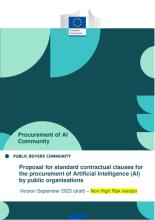
The Legal working group assesses contractual and legislative measures needed to provide cities and communities with a common EU framework for cross-sector and cross-border digital solutions.
In 2025, the Legal working group gathered feedback from cities, regions & communities on the EU Apply AI Strategy, explored the EU Digital Wallets and urban use cases, and guided local and regional authorities through EU initiatives such as EDICs and the LDT procurement support materials.
In 2026, the Legal working group will:
-
Continue to follow and analyse EU legislative measures and policy proposals and their impact across cities, regions, and member states
- Discuss the most recent updates of the Digital Wallet legislation and pilot use cases, including the European Business Wallet proposal
- Present best practices from cities and regions on the implementation of the AI Act
- Explore EU initiatives such as the Apply AI instruments for public administrations
- Discuss the impact of striving towards EU digital sovereignty at the local and regional level.
Meet the Legal Working Group Chair!

Patrícia Vieira is a Senior Project Manager at Porto Municipality and Chair of the Legal Working Group of the Living-in.EU movement. With extensive expertise in public accounting, public procurement, and funding sources, she is committed to transforming the public sector.
Patrícia has led cross-disciplinary projects, always with a strategic and holistic outlook. She values the opportunity to engage in meaningful discussions with colleagues from diverse backgrounds and perspectives. Her “helicopter” view of the areas she oversees enables her to identify opportunities for optimisation and adaptation to the ongoing legislative and regulatory changes. With a focus on process innovation and reorganisation, she connects organisational needs with legal requirements, finding creative solutions to complex challenges.
Since 2009, her deep involvement with public procurement from various perspectives has provided her with unique insights into the legal aspects, as well as the obstacles faced by the different stakeholders within this ecosystem.
Patrícia is an unwavering advocate for a more efficient, transparent, and innovative public administration, dedicated to shaping the future of Europe in an inclusive and sustainable manner.
------
When everything seems to be going against you, remember that the airplane takes off against the wind, not with it. (Henry Ford)











